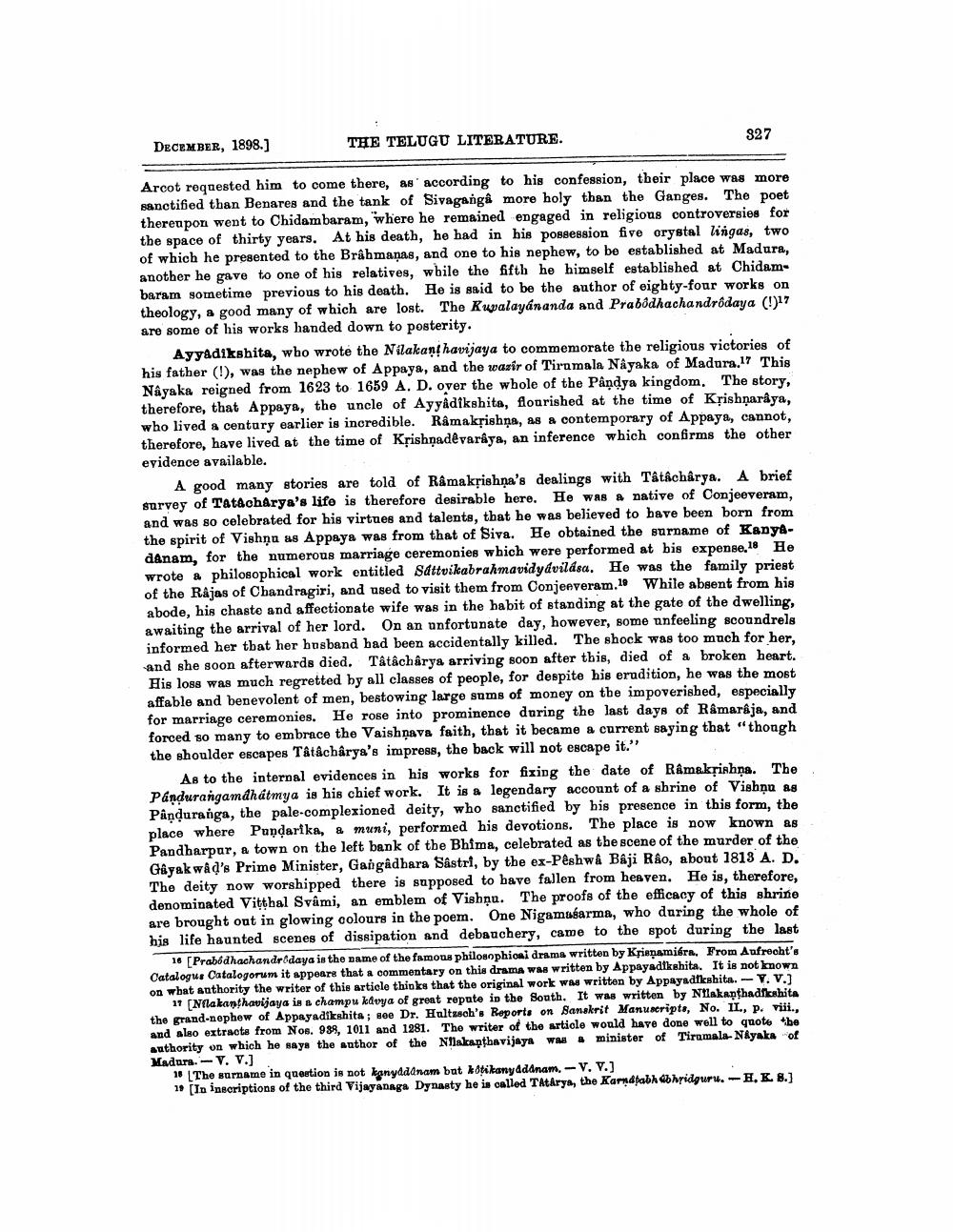________________
DECEMBER, 1898.]
THE TELUGU LITERATURE.
327
Arcot requested him to come there, as' according to his confession, their place was more sanctified than Benares and the tank of Sivagangê more holy than the Ganges. The poet thereupon went to Chidambaram, where he remained engaged in religious controversies for the space of thirty years. At his death, he had in his possession five orystal lingas, two of which he presented to the Brahmaņas, and one to his nephew, to be established at Madura, another he gave to one of his relatives, while the fifth he himself established at Chidambaram sometime previous to his death. He is said to be the author of eighty-four works on theology, a good many of which are lost. The Kupalayananda and Prabodhachandrôdaya (117 are some of his works handed down to posterity.
Ayyadikshita, who wrote the Nilakanhavijaya to commemorate the religious victories of his father (!), was the nephew of Appaya, and the wazir of Tirumala Nayaka of Madura.17 This Nâyaka reigned from 1623 to 1659 A. D. over the whole of the Pandya kingdom. The story, therefore, that Appaya, the uncle of Ayyadikshita, flourished at the time of Krishnaraya, who lived a century earlier is incredible. Ramakrishna, as a contemporary of Appaya, cannot, therefore, have lived at the time of Kộishnadevaraya, an inference which confirms the other evidence available.
A good many stories are told of Ramakrishna's dealings with Tátâchârya. A brief survey of Tatacharya's life is therefore desirable here. He was a native of Conjeeveram, and was so celebrated for his virtues and talents, that he was believed to have been born from the spirit of Vishņa as Appaya was from that of Siva. He obtained the surname of Kanyadanam, for the numerous marriage ceremonies which were performed at bis expense,18 He wrote a philosophical work entitled såttvikabrahmavidydvildsa. He was the family priest of the Rajas of Chandragiri, and used to visit them from Conjeeveram.2• While absent from his abode, his chaste and affectionate wife was in the habit of standing at the gate of the dwelling, awaiting the arrival of her lord. On an unfortunate day, however, some unfeeling scoundrels informed her tbat her husband bad been accidentally killed. The shock was too much for her, and she soon afterwards died. Tâtâcharya arriving soon after this, died of a broken heart. His loss was much regretted by all classes of people, for despite his erudition, he was the most affable and benevolent of men, bestowing large sums of money on the impoverished, especially for marriage ceremonies. He rose into prominence during the last days of Râmarêja, and forced so many to embrace the Vaishnava faith, that it became a current saying that "thongh the shoulder escapes Tatâcharya's impress, the back will not escape it."
As to the internal evidences in his works for fizing the date of Râmaksiahņa. The Pandurangamdhatmya is his chief work. It is a legendary account of a shrine of Vishnu as Panduranga, the pale-complexioned deity, who sanctified by his presence in this form, the place where Pandarika, a muni, performed his devotions. The place is now known as Pandharpar, a town on the left bank of the Bhima, celebrated as the scene of the murder of the Gêyak wad's Prime Minister, Gangadhara Sastri, by the ex-Peshwa Baji Rao, about 1813 A. D. The deity now worshipped there is supposed to have fallen from heaven. He is, therefore, denominated Vitthal Svâmi, an emblem of Vishņu. The proofs of the efficacy of this shrine are brought out in glowing colours in the poem. One Nigamasarma, who during the whole of his life haunted scenes of dissipation and debauchery, came to the spot during the last
16 (Prabodhachandr daya is the name of the famous philosophical drama written by Krienamiéra. From Anfrecht's Catalogus Catalogorum it appears that a commentary on this drama was written by Appayadékshita. It is not known on what anthority the writer of this article thinks that the original work was written by Appayadtleshita. -V. V.)
11 [Nflakanthavijaya is a champu kavya of great repute in the South. It was written by Ntlakapthadichita the grand-nephew of Appayadikshita ; see Dr. Hultasch's Reports on Sanskrit Manuscripts, No. II., P. viii., and also extracts from Nos. 939, 1011 and 1281. The writer of the article would have done well to quote be authority on which he says the author of the Nakanthavijaya Wa # minister of Tiramala- Nkyaka of Madura. -V. V.)
1 (The surname in question is not kanyddanam bat katikanyddanam.-Y. V. 11 [In inscriptions of the third Vijayanaga Dynasty he is called Tatarya, the Kardabh bhridguru.-H. K. 8.]




